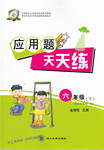题目内容
--Which side of the boat can I sit on?
--If you sit still, you can sit on ________.
[ ]
A.neither side
B.every side
C.both sides
D.either side
答案:D
解析:
解析:
|
本句意为“如果你坐着不动,两边你都可以坐”。 |

练习册系列答案
 应用题天天练四川大学出版社系列答案
应用题天天练四川大学出版社系列答案
相关题目